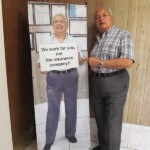
Not-So-Good Hands: Allstate Drops the Ball on P&M Rates, Sublet Scan Costs
Published in New Jersey Automotive – Thomas Greco Publishing
Don Harvey, manager for a North Jersey body shop, had been receiving compensation from Allstate Insurance on sublet-paid vehicle scans as well as paint and material costs for quite some time without experiencing any issues, but that changed earlier this year when he submitted a virtual assist supplement that has yet to be resolved, over three months later.
 In response to the supplement, Allstate’s Ruby Felton promised to “get back to me and send the supplement, but she never called me to discuss any differences,” reports Harvey, who provided an invoice for the sublet scan and a vehicle-and-color-specific copy of the Mitchell paint cost calculation as documentation justifying his costs.
In response to the supplement, Allstate’s Ruby Felton promised to “get back to me and send the supplement, but she never called me to discuss any differences,” reports Harvey, who provided an invoice for the sublet scan and a vehicle-and-color-specific copy of the Mitchell paint cost calculation as documentation justifying his costs.
While Felton acknowledged, “Per the New Jersey Department of Insurance, insurance carriers, including Allstate, owe what is fair and reasonable to return your vehicle to pre-loss condition,” she simultaneously informed the vehicle owner that they could be responsible for the difference between the shop’s invoice and Allstate’s estimate. “Your shop has requested charges that are beyond what is reasonable and customary. Therefore, we are unable to honor your shop’s request. You could be responsible for these charges if your shop refuses to release your vehicle before the additional charges have been paid,” Felton wrote in an email to the customer. “The reason that you may be responsible for these additional charges is that Allstate pays for what is reasonable and customary in your market area.”
Although Felton also claimed, “Our attempts to negotiate the request were unsuccessful,” Harvey insists that no such negotiations were ever attempted.
According to Felton, Allstate has found that a 0.5 mechanical hour (a charge of $40) is sufficient for the pre-scan and the post-scan, thus she offered $80 for the two scans, despite the body shop producing an invoice from the sublet company for $250. Her offer of less than one-third of Harvey’s cost also disregarded his facility’s markup on the sublet operation.
She also declined the copy of Mitchell’s paint and materials calculation, provided by Harvey, because “The prevailing market rate for paint and materials is $35 per hour, per the labor hours calculated by a nationally-recognized and industry-accepted estimating system to repair your auto.” She further claimed, “The shop is requesting an additional $208.09, which is also more than the market’s prevailing rate.”
So, how does Allstate determine “prevailing rate” anyway? “Our management team surveys market areas twice a year to confirm the prevailing rates in each market area,” Felton explained in her email, yet Harvey “has never encountered one in my 53 years in the business. If they exist, AASP/NJ and I would both like to see these surveys!”
Unsatisfied with the lack of response received from Allstate’s team, Harvey reached out directly to Allstate CEO Tom Wilson to express his concerns with “a contradiction to previous acknowledgements with Allstate here in New Jersey in regard to both sublet invoicing for vehicle pre- and post-scans and paint material compensation for materials used.” He went on to ask Wilson to review the correspondence between Felton and the vehicle owner “to see if it contradicts Allstate’s position and make the adjustments to the supplement properly compensating for the repairs completed.”
In his email, Harvey specifically noted that the New Jersey Department of Banking and Insurance (DOBI) has previously addressed the issue of paint and material costs in Bulletin No. 07-20, dated 10/25/2007, which states, “that the actual costs of paint and materials have increased over time and that some insurers’ allowances do not reflect the actual cost of the paint and/or material […] resulting in repair estimates that do not provide a sufficient allowance to restore the vehicle to its condition immediately prior to the loss.”
Through the bulletin, DOBI also expressed the expectation for insurers to “provide repair allowances that are sufficient to restore damaged vehicles to their pre-accident condition,” encouraging the use of paint and materials cost calculators and programs “to assist insurers in achieving consistent compliance.”
DOBI further indicated its intent to monitor claims practices to confirm that all allowances related to the repair process are sufficient, warning “Insurers are expected to be prepared to justify their repair allowances.”
After numerous emails to WIlson went unanswered, Harvey sent a letter via USPS, again commenting on the DOBI bulletin that Allstate seems to be ignoring. “Paint material calculators are color and vehicle specific, with many hours of research by third-party companies reflecting the actual cost to the body repair facility,” Harvey reiterated. “No two colors are the same, nor do they cost the same. The cost of material used for a vehicle with three-stage pearl white is not the same as a vehicle refinished blue metallic two-stage, let alone a three-stage pearl red, one of the most expensive colors we deal with. That is why the use of an independent paint calculator is both accurate for the vehicle being repaired and refinished as well as being FAIR!”
He expressed confusion with Allstate’s change in position. “Throughout the years, Allstate has acknowledged the use of the Mitchell paint calculator and I am now told because Allstate has changed their arbitrary, unsubstantiated paint rate from $35 to $37 per hour, they will no longer acknowledge the use of a paint calculator here in New Jersey,” he continued, requesting Allstate justify their repair rate.
Further alluding to the market surveys, Harvey again asked to see a copy of the most recent survey for his market, noting that “the cost of paint material has skyrocketed over the past year and shows no sign of lowering. That is why the use of a paint calculator is both necessary and FAIR to all involved.
“I am not asking for something not done or supplied, only for what is verifiable and used to properly restore a vehicle to pre-loss condition. Paint applied to an automobile is the same as a part replaced and should be treated the same with a reasonable markup,” Harvey stressed. “At the arbitrary amount of $37 per hour, vehicles are getting paint materials below our cost, and as an insurer, you know selling something below cost does not make business sense.
“I respectfully request you look into this matter and correct a wrong being forced upon our industry here in New Jersey,” he concluded his appeal.
The shop’s invoice was based on documented costs with a markup added as indicated in Harvey’s letter. “We start our paint and material cost at $40 per hour and finalize when the repair is completed and all areas are refinished with the Mitchell paint cost calculator,” Harvey told New Jersey Automotive. “Pre/post and re-programming scans with sublet invoicing have been acknowledged by all insurance companies (even Allstate) until recently. Interestingly enough, as this battle was underway, I did another virtual supplement where Allstate sent me their Mitchell paint cost calculation sheet, excluding a markup, which contradicted the response I have been receiving from their team on this claim. To date, the paint and sublet scan have not been resolved.”
Harvey firmly believes that a business deserves to turn a profit which means including a reasonable markup for replaced parts. As such, he views paint and material as a part that should reflect a reasonable profit margin. “Paint and material costs are increasing monthly as any facility purchasing will attest to. That is why an arbitrary per hour multiplier is both inaccurate and unfair. I for one would like to see an insurance company JUSTIFY the rates they impose on this industry, or better yet purchase all the supplies needed to prepare and refinish the vehicles written.”
While Allstate has yet to produce the survey by which they’ve determined a “prevailing rate” of $40 for pre- and post-repair scans as well as a paint and material cost of $35 per hour, National AutoBody Research’s (NABR) Labor Rate Hero offers insight in the North Jersey market (though it’s important to note that some of the shops have not updated the website in up to four years, indicating that the amounts cited as likely lower than today’s costs).
Based on LaborRateHero.com, shops within a 25-mile radius of Harvey’s shop charge an average of $146 for scans, with a low-end charge reflected as $60. The high-end amount charged for a pre-scan is $265, while a post-scan can cost as much as $250. Paint and material costs show a range of $30 to $60 with an average of $42 per hour. These figures seem to substantiate the rates charged by the shop and call into question whether Allstate is dropping the ball when it comes to proper compensation.
Yet, an email Harvey received from Allstate’s Jerry DeGrendele took the position that “Allstate’s estimate is proper as per the New Jersey Department of Insurance regulations for both paint and materials, as well as scans,” calling into question whether DOBI will step up to defend shops and New Jersey consumers against these unsubstantiated and falsely suppressed rates. Based on last month’s cover story (you can read it at
grecopublishing.com/nja0523coverstory), it seems unlikely.
In the meantime, it remains to be seen whether anyone actually cares about Garden State drivers, other than the shops fighting to ensure their vehicles are safely and properly repaired…shops that deserve to be compensated for their labors. But where are the “good hands” when it comes to paying to restore those cars to their pre-loss condition?




